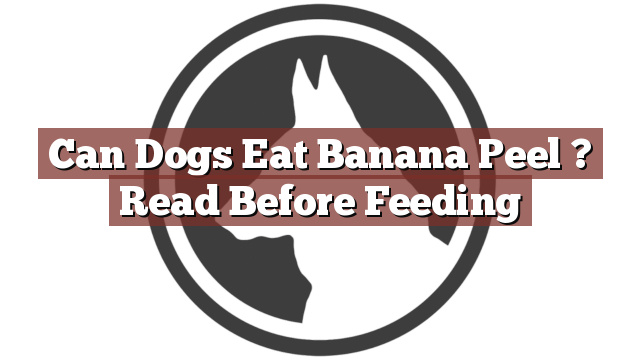Understanding Your Dog’s Dietary Needs
As dog owners, it is essential to understand the dietary needs of our furry friends. While dogs are omnivores, meaning they can consume both meat and plant-based foods, not all human foods are safe for them. It is crucial to be aware of what foods are safe and beneficial for our dogs’ health. This knowledge ensures that we provide them with a balanced and nutritious diet, promoting their overall well-being.
Can Dogs Eat Banana Peel? Read Before Feeding
One common question that arises is, "can dogs eat banana peel?" Many dog owners wonder if it is safe to offer their pets the peel of this popular fruit. The answer is no, dogs should not eat banana peels. Although banana peels are not toxic to dogs, they can be challenging for their digestive system to break down properly. The tough and fibrous nature of the peel poses a choking hazard and may cause gastrointestinal blockages if ingested. It is best to remove the peel and only feed your dog the soft, ripe banana flesh.
Pros and Cons of Feeding Banana Peel to Your Dog
Feeding banana peel to your dog may seem like a convenient way to utilize the entire fruit without waste. However, it is important to weigh the pros and cons before introducing banana peels into your dog’s diet.
One potential benefit of feeding banana peels is their high fiber content. Fiber can aid in digestion and promote bowel regularity in dogs. However, dogs already receive sufficient fiber from their regular diet, and adding banana peels may lead to an excess of fiber, causing digestive issues such as diarrhea or constipation.
On the other hand, the cons of feeding banana peels to your dog outweigh the potential benefits. The risk of choking or gastrointestinal blockage is significant. Additionally, pesticides or chemicals used in the cultivation of bananas may reside on the peel, posing a health risk to your dog. It is always better to err on the side of caution and avoid feeding banana peels to your furry companion.
Conclusion: Weighing the Benefits and Risks of Feeding Banana Peel to Your Dog
In conclusion, while dogs can enjoy the tasty and nutritious flesh of a banana, it is advisable to refrain from feeding them the peel. The tough texture and potential hazards associated with banana peels make them unsuitable for canine consumption. To ensure the well-being of your dog, it is best to stick to a balanced diet specifically formulated for their nutritional needs. If you have any concerns about your dog’s diet or are considering introducing new foods, consult with your veterinarian for personalized advice and guidance. Remember, your dog’s health and safety should always be the top priority.
Thank you for taking the time to read through our exploration of [page_title]. As every dog lover knows, our furry friends have unique dietary needs and responses, often varying from one canine to another. This is why it's paramount to approach any changes in their diet with caution and knowledge.
Before introducing any new treats or making alterations to your dog's diet based on our insights, it's crucial to consult with a veterinarian about [page_title]. Their expertise ensures that the choices you make are well-suited to your particular pet's health and well-being.
Even seemingly harmless foods can sometimes lead to allergic reactions or digestive issues, which is why monitoring your dog after introducing any new food item is essential.
The content provided here on [page_title] is crafted with care, thorough research, and a genuine love for dogs. Nevertheless, it serves as a general guideline and should not be considered a substitute for professional veterinary advice.
Always prioritize the expert insights of your veterinarian, and remember that the health and happiness of your furry companion come first.
May your journey with your pet continue to be filled with joy, love, and safe culinary adventures. Happy reading, and even happier snacking for your canine friend!

